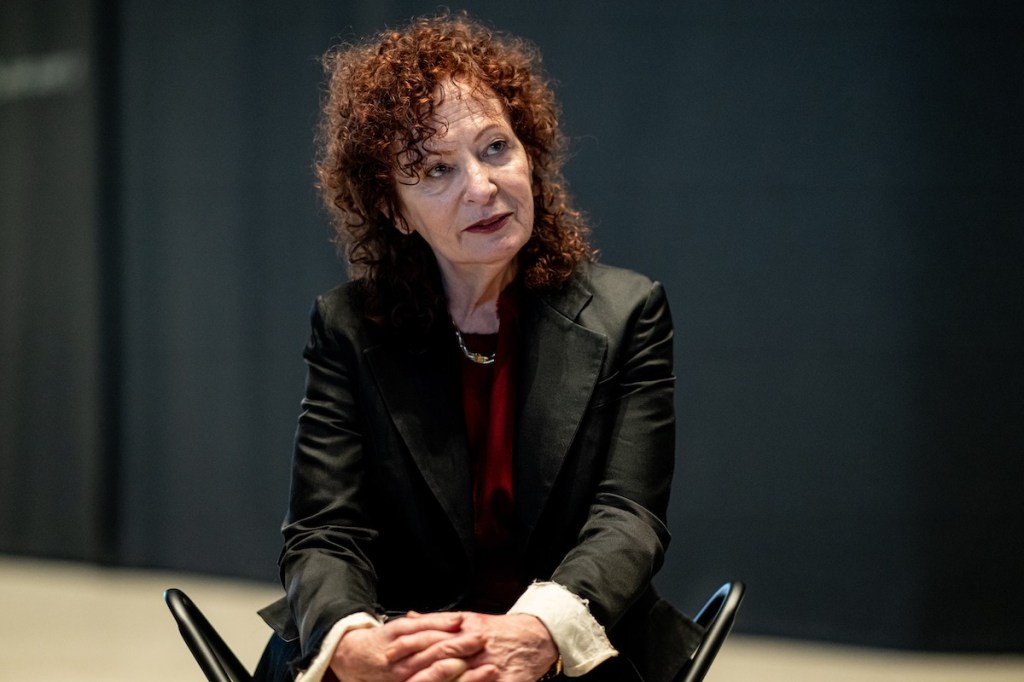Every public library is an exception. The world outside is costly and cordoned off, but here no one is charged, and no one is turned away. People browse for books and go online. They learn English, meet with friends, dawdle, nap, and play. For children, the public library is a place to build an inner life, unencumbered by grownups. Story time is an invitation to that experience. A librarian reads a book aloud to a huddle of kids seated cross-legged on the floor. It’s part early-literacy tool, part theatre, and looks basically the same wherever it happens. The public libraries in Flathead County, Montana, a region of mountainous beauty bordering Canada and Glacier National Park, offer seven story times per week, for babies on up. Three scattered branch locations—in Kalispell, Columbia Falls, and Bigfork—serve a population of a hundred and eleven thousand people, spread out over five thousand rugged square miles.
On a spring day in 2019, Ellie Newell, the youth-services librarian at the main branch, in a historic post office in downtown Kalispell, hosted a special story time for a visiting class of preschoolers. Newell was raised by librarians and had taken the job straight out of graduate school, drawn to Flathead’s reputation for “doing cutting-edge library stuff.” Several years earlier, the library had rebranded to adopt a new name and logo, as well as an updated, possibly foolhardy mission. The Flathead County Library System became the ImagineIF Libraries and set out to use technology and interactive programs to bring together far-flung residents of the county. This new approach earned ImagineIF a John Cotton Dana Award (the equivalent of a library Oscar) and the title of State Library of the Year.
Like most children’s librarians, Newell did a lot of story times and kept a stack of read-aloud books on her desk. She considered it important to mix things up: some books with animals, some with people; some classics, some new releases. At the top of Newell’s pile that day was “Prince & Knight,” a fairy-tale picture book published in 2018. The story features a charismatic dragon, but no lady who wins a warrior’s heart. The romance instead unfolds between the titular prince (a man) and knight (also a man). Newell thought the book was sweet: a bit edgy in its gayness, but still chaste and traditional, culminating in marriage. Her calendar didn’t show any special book requests or even the name of the visiting school, so she grabbed “Prince & Knight” off her desk and went out to read it. She opened her eyes wide behind her glasses and swivelled to connect with every member of her audience. The children giggled and clapped. But, at the end of the reading, their teacher looked upset.
The class had come from a Catholic school, and, a few days later, the teacher wrote to the Daily Inter Lake, a local newspaper, saying how “shocked and grieved” she was by the presentation of a book about “homosexual marriage.” She argued that “such a controversial topic” should not be introduced to “innocent children.” Flathead County had always trended conservative, and harbored clusters of Ammon Bundy extremists, but its mainstream politics, until recently, tended toward a live-and-let-live libertarianism. The weeks that followed stunned library staff. Newell, who is openly bisexual, was harassed: “I had people get in my face, yell, and spit, and scream an inch from my face.” At an outreach event, she was grabbed by a man complaining of the “library’s agenda about transgenderism.” In April, a queer-youth support group met, as it often did, in the library basement. Afterward, several men waiting outside chased two of the teens down the street, yelling, “Fucking faggots.”
During the pandemic, Flathead became the fastest-growing county in the state, thanks in part to new migration. The arrivals were split between lovers of the outdoors (of various political persuasions) and people in search of a Trumpian refuge from urban ills. The responses to the “Prince & Knight” reading tracked with the county’s divergent politics. Was the story time a sign of open-mindedness or proof that the library was promoting “all these alternative lifestyles,” as one Kalispell man wrote to the Inter Lake? The Catholic schoolteacher filed a formal challenge to “Prince & Knight,” seeking its removal from ImagineIF’s collection. The library director, Connie Behe, recommended that the book be retained because the work as a whole conformed to ImagineIF standards. The final decision was up to the library’s five-member board of trustees.
A meeting was held to hear public comments on the book challenge. Board meetings were usually sedate affairs, but a small crowd filled the meeting room in the basement of the Kalispell branch. Most came to speak in support of “Prince & Knight,” but a landscaper named Doug Adams volunteered a contrasting view. Adams was an evangelical Christian with salt-and-pepper hair and a lilting cadence nurtured in his native Georgia. “I don’t think that this was a venue in which that should have been displayed to little kids,” he said. “I’m not sure it’s an agenda that should have been displayed to anybody.”
Adams did not like the book, but he didn’t advocate for its removal, either. The board voted to keep the book in the collection, and subsequent meetings were quiet. It appeared that the tumult over Newell’s story time had settled. Then, two months later, a spot on the board opened up and Adams applied for the position. Board members were appointed by a trio of elected county commissioners, all of whom were conservative Republicans. The newest commissioner was Randy Brodehl, a former state legislator and retired fire chief with a fondness for Western attire. When Adams applied, a supporter of ImagineIF went to Brodehl with an op-ed that Adams had written in the Inter Lake just after Donald Trump’s Inauguration. In the article, Adams instructed liberals to “toughen up and take it,” just as he had done during the Obama Administration. “I have to go against everything I believe in order to not disenfranchise someone who can’t come to grips with his/her/its sex,” he wrote. “I have to be ashamed of America in order not to offend an illegal alien. I have to let perverts use the restroom with my wife.” The library supporter hoped that Brodehl would be shocked by Adams’s polemic. “When I think about the idiocy of trying to give Randy a heads-up about Doug’s divisiveness, I wish I could go back in time and slap myself,” she told me. (Brodehl said that he did not recall having this conversation.)
In fact, Brodehl’s fellow county commissioners, who belonged to the right wing of the Flathead Republican Party, had encouraged Adams to apply for the library board. The commissioners seemed to think that the library director and employees were too liberal, and that the library board too often bent to their will. Adams agreed. He had accused ImagineIF of using taxpayer funds to push a “gay agenda.” He said repeatedly that, if it were up to him to create a library, it would “be a religious library.” The commissioners unanimously appointed him to the board.
For years, the Flathead County Library System operated with little controversy. It did what it could with a small budget, a team of three dozen full- and part-time employees, and the fund-raising help of a dedicated nonprofit. Kim Crowley became the director of the system in 2004. I met her in February at the Bigfork branch, a “nano-library” the size of a large apartment, situated in a ski-lodge-style civic complex, about a thirty-minute drive from Kalispell. Crowley is lean and plainspoken, and worked in commercial fishing before going to library school. When she came to Flathead County, she found the libraries to be old-fashioned—little more than repositories for books—and “ripe for reimagining,” she told me. There was a fourth branch back then, in the resort town of Whitefish, that resisted Crowley’s reforms and seceded from the county system. Crowley went ahead with the rebranding. At the new ImagineIF, furniture was removed to increase space for meetings and play. A book bike went out to the community, and youth-services librarians expanded their story times in parks and schools. There were no more fines for overdue materials.
The changes were popular, but not universally so. Some residents didn’t like that the county’s name had been erased. They saw ImagineIF as a space of haughty leftism, run by women with master’s degrees. Crowley had the library board’s support at the time, but the county commissioners were dubious and began to inspect her spending. They refused her request to buy a Toyota Prius for transporting staff and supplies between branches: Couldn’t she pick something less obviously enviro-Democrat?
In retrospect, the skirmishing over ImagineIF contained the germ of today’s library wars. Public libraries—once as popular with libertarian autodidacts as leftists—have become targets of the Republican Party, and not just in Flathead County. Local-library systems, and local librarians, are being vilified nationwide as peddlers of Marxism and child pornography. Whatever faith there was in public learning and public space is fraying. Though book bans aren’t new, current bids at censorship are often paired with cuts to library budgets. Last month, the Missouri House of Representatives tried to eliminate all funding for public libraries. A group of citizens in Ada County, Idaho, attempted to force a vote that would dissolve the local-library system. Tactics previously applied in public schools, ostensibly to protect children, are now being used against city- and county-library systems whose mandate is to help everyone.
Part of the issue in Flathead County was a disagreement over the term “everyone.” The commissioners and conservative trustees appeared to prioritize the majority. If the area was predominantly white, straight, and Christian, then books such as “Prince & Knight” surely had no place in the public library. The workers of ImagineIF saw things differently. Yes, they served a large number of devout homeschooling families. But they also catered to atheists, immigrants, racial minorities, and people who are L.G.B.T.Q.+. Nor was it their job to assume what kinds of books or DVDs a given patron would want. “The library has always been an organization that collects not just for majority populations but also minority populations,” said John Chrastka, of the national advocacy group EveryLibrary, which advised ImagineIF’s staff and trustees. S. R. Ranganathan, a founder of library science, made the same argument a century ago, in his statement of basic principles: “Every reader his book. Every book its reader.”
In 2018, Crowley grew tired of her dealings with the commissioners and retired early. Behe, the longtime assistant director, took over. She shared Crowley’s enthusiasm for making ImagineIF “an inspired, creative place,” but had a softer, conciliatory bearing that she hoped would mollify the commissioners. Not long into her term, though, came the controversy over “Prince & Knight.” That month, the library’s fund-raising nonprofit, the ImagineIF Foundation, had the misfortune of having to announce a capital campaign for a new, larger Bigfork branch. The county commissioners declared that they would have nothing to do with the project. (Brodehl, the commissioner, told me that the decision was budgetary and unrelated to the story-time reading.)
Soon, COVID-19 arrived. Flathead County had some of the highest caseloads in the state, prompting the nearby Blackfeet Nation to impose a stay-at-home order and close the eastern entrance to Glacier National Park. The county government, in contrast, debated how dangerous the virus really was. A doctor on the Board of Health deemed the coronavirus “no more dangerous than influenza.” Commissioner Brodehl told reporters, “Whether you choose to mask up or make a different choice should belong to our citizens.” Behe was far more cautious. She shut down all three branches of ImagineIF, then mandated face coverings when it came time to gradually reopen. Many patrons reacted angrily to this policy and accosted library employees. Behe tried to mediate, and trained her team on how to communicate across political divides.










